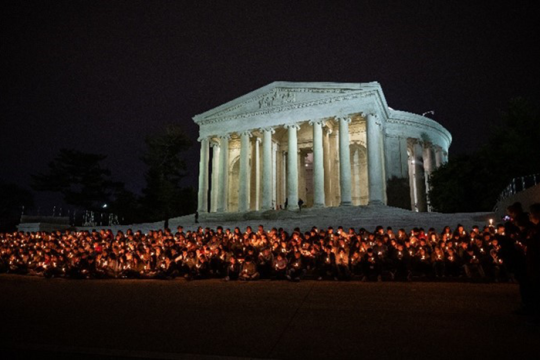
Moses is perhaps the only person who knew the date of his death. As the Israelites draw close to the Promised Land, God tells him, “You may view the land from a distance, but you shall not enter it (Deuteronomy 32:52).” Moses has fulfilled his mission of having shepherded the people to the land. He gives them a last blessing, looks over the land that they will enter, and dies.
Middle Passage did not imagine that he would die on the road to Washington, DC. The 68-year-old Vietnam War Veteran started America’s Journey for Justice in Selma, Alabama and planned to march the entire 1000 miles. Each day he put on his NAACP hat, picked up the American flag, and marched at the front of the line. He welcomed in each new crew of marchers, setting up their cots, orienting them to the day’s marching, and explaining his name. Middle Passage chose his unusual name to honor his ancestors who endured the trip from Africa to the horrors of slavery in America. Despite this dark history, Middle Passage deeply loved this country and believed that we could do better. He joined the march to raise awareness of voting rights. He was troubled that it is getting harder and harder to vote in this country. He also wanted young people, especially young African Americans, to vote in each and every election. The flag that he held and the Torah that accompanied the marchers every day are each a reminder of our patriotism, our love of country, and the living nature of God’s words.
Tragically, Middle Passage died 922 miles into the march. Unlike Moses, he was not able to lead the marchers to the final destination. But like Moses, he left with us a teaching about how we should live our lives to the fullest. He did not make long speeches, but he left a lasting impression with everyone he met, even if only after a day of marching. After he died, rabbis from across our Movement shared memories of this determined leader. He set the pace and we struggled to keep up. He shouted out “hole” to warn others of the uneven road ahead. He thanked the dedicated law enforcement officers who accompanied the march at the end of each and every day. And, he shared his story and opened his heart to all he met.
Tonight, we prepare to enter Yom Kippur, a day when we look back on our deeds over the past year and seek forgiveness. As we contemplate our own mortality, Middle Passage stands as an example to us all. He shows us what it means to live our values each and every day, to open our hearts with love to people of every background, and to deeply touch the lives of those around us. Unlike Moses, we do not know the date of our own death. Therefore it is incumbent upon us to follow the example of Middle Passage each and every day. In the year 5776, may we live each day to its fullest, pursue what we love and touch the lives of all we meet.
Rabbi Erica Asch is the rabbi of Temple Beth El in Augusta, Maine and serves on the leadership team for Rabbis Organizing Rabbis.
Related Posts

Teens from North Carolina Speak About Environmental Justice

Why is this Right Different?: City of Grants Pass, Oregon v. Johnson and the Passover Call to Action

